Newsmakers 2004
Planning is underway for McGill's next big capital campaign and the university's fundraisers are gearing up for the challenge. Chances are, though, that they won't have to work anywhere near as hard as four McGill University Health Centre (MUHC) researchers did in September when they went about raising money for children and women in Africa who are afflicted with HIV/AIDS.
The MUHC quartet — human genetics professor Patrick Scott, master's student Jacqui Quinlan and lab technologists Gregory Dijkman and Robert Mio — were part of a team of 13 climbers who contended with freezing-cold temperatures and altitude sickness as they scaled Mount Kilimanjaro, Africa's highest mountain. The effort earned $160,000 in donations of medicine, equipment, clothing and cash for shelters and clinics in Africa.
While few others at McGill scaled comparable heights in quite such a literal way, 2004 was a pretty good year for the university. McGill earned high marks from the media in a variety of categories.
McGill was named the second-best medical-doctoral university in Canada (Maclean's), one of the best 25 universities in the world (Times Higher Education Supplement), one of the 10 best places for postdocs to pursue their research (New Scientist) and the North American university where students from a variety of socio-economic and cultural backgrounds get along the best with one another (Princeton Review).
Maclean's noted that our students win more national prizes than any of their peers in Canada. They're a pretty talented bunch outside the classroom too. Eight McGill students travelled to Athens this summer to compete in the Summer Olympics, accompanied by Team Canada's chief medical officer, McGill medicine professor Robert Foxford.
Two McGill students earned world championships in 2004. Management student Jennifer Heil made a triumphant return to the moguls skiing circuit after a one-year absence to earn the world title in her sport, while kinesiology and physical education student Kim St. Pierre continued to make a case for herself as the best female goalie in the world, leading Team Canada to victory at the World Women's Hockey Championships.
If 2004 was the year of reality TV, well, McGill students played a role there too. Daniel Jacob, a towering 6'6" defenceman with the Redmen, was one of 4,000 hopefuls who took part in CBC's "Making The Cut," a show that chronicled the progress of dozens of players in search of a crack at the NHL. Jacob was one of the finalists and earned an invitation to the Florida Panthers' training camp, which, given the current progress in the NHL's labour negotiations, ought to be open for business sometime in 2010.
Biology and physics student Alain Macklovitch also had an interesting year. A three-time world DJ champion, Macklovitch is a gifted turntablist who performs as DJ A-Trak. In May, Macklovitch was invited to tour with a couple of musicians. Guys by the names of Usher and Kanye West — maybe you've heard of them? Macklovitch took a semester off to accompany the superstars, but confessed to the McGill Tribune that he felt homesick for McGill at times. "I miss the Bunsen burners."
McGill music professor Matt Haimovitz, one of North America's most respected cellists, made news in 2004 for his own unorthodox concert tour. "After hundreds of concert hall performances, I couldn't escape one very clear fact," he told the Honolulu Star-Bulletin. "I hardly ever saw members of my generation in the audience."
In a bid to make classical music more accessible to his peers, Haimovitz toured the U.S., bringing Bach to pizza parlours, coffeehouses and legendary New York punk club CBGB, the venue that helped launch the careers of the Ramones, the Talking Heads and Blondie. One of each concert's highlights is Haimovitz's Jimi Hendrix–style rendition of "Star-Spangled Banner." On the cello, of course.
Haimovitz wasn't the only McGill professor to make news in 2004. McGill researchers discovered promising new methods for combatting cancer (William Muller and Jerry Pelletier to name two), uncovered startling evidence that carnivorous dinosaurs once lived in the Canadian Arctic (Hans Larsson), figured out why Paul Martin's Liberals almost blew the federal election (Elisabeth Gidengil) and developed computer games that actually boost players' self-esteem (Mark Baldwin and a team of graduate students). All those frustrating hours I've spent wandering around in Myst, totally lost and feeling like a doofus, are now at an end.
As per usual, McGill's scholars and scientists turned up in the pages of newspapers and magazines and on TV and radio shows aplenty during 2004. Using various media databases, we've put together a list of the 10 professors who attracted attention from the greatest number of different media.
To qualify for the list below, stories about the professors had to mention their connection to McGill and had to give some sense of their area of research expertise. The listing reveals how many media deemed the professors newsworthy, not how often the professors appeared in the press in total. For instance, Margaret Somerville, one of our newsmakers, turned up in the pages of the National Post several times last year — we only count the Post once for our purposes. Another newsmaker, Karen Johnston, appeared in more than the 40 media we refer to, but many newspapers neglected to mention her ties to McGill, so we didn't count them for this exercise.
1
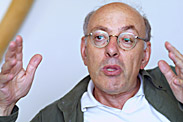
Owen Egan
Our number one McGill newsmaker has made no secret of his disdain for the traditional MBA programs offered by most business schools in North America. But this was the year he published a book detailing his stinging criticisms. Management professor Henry Mintzberg's Managers Not MBAs attracted much attention as a result.
"Conventional MBAs train the wrong people in the wrong ways with the wrong consequences," Mintzberg told Britain's The Times of Britain. Young students with little business experience can't be transformed into business leaders by dint of puzzling their way through a series of academic case study exercises.
"What you can do is take people who are managers and, if you design the program to enhance their appreciation and understanding of management, make them more thoughtful managers," says Mintzberg. He has played a leading role in developing just such programs at McGill.
While Mintzberg doubtless received few holiday cards from MBA program directors, the Economist singled out Managers Not MBAs as one of the best business books of 2004 and 131 different media ran stories featuring Mintzberg's views, including US News & World Report, Business Week and the Financial Times.
2
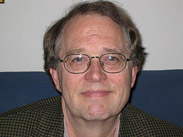
Second spot belongs to another management professor, Robert Hebdon. Hebdon, whose research interests include labour relations, collective bargaining and dispute resolution, turned up in 74 different media, including the Chicago Sun-Times, the Boston Herald and the Washington Times, thanks to a pair of widely syndicated stories about the surprising success of Wal-Mart workers in Jonquière in their bid to form a union at the notoriously union-resistant retail giant.
Musing about whether or not the Jonquière situation will be played out at other Wal-Marts, Hebdon said, "It's a little bit like watching a hurricane form. You don't know whether it's going to be just be a little bit of wind... or whether it's going to be a storm, a full-blown storm."
3
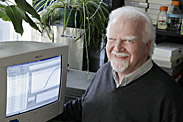
Owen Egan
An authority on reproductive pharmacology, Bernard Robaire finds himself in third place on our list. A hot media topic in 2004 was the search for an easy-to-use and reliable male contraceptive — one that ideally involves neither latex nor scalpels. Robaire explained to Associated Press that finding such a drug is no easy task.
Men can produce 100 million sperm each day and, as Robaire says, "probably, as little as five percent of those sperm are enough to maintain fertility," so any treatment would have to be 100 percent effective to work properly. In addition, men would steer clear of any contraceptive with side effects. "You couldn't ask more of a drug," says Robaire. "It's really the ultimate challenge." The professor of pharmacology and therapeutics was cited in news stories appearing in 63 different media.
4
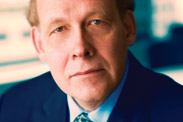
Claudio Calligaris
Fourth position belongs to management professor Karl Moore, an expert on business strategy and globalization. Moore has been a consultant for such major companies as Nokia, British Airways and IBM, so when the media go looking for some insight into the inner workings of large companies, they often call him up, whether it's about Bombardier's post–Paul Tellier prospects, or about Air Canada's chances for charting a turbulence-free future for itself. Moore appeared in 51 different media last year, including CBC Radio's "The Current," the New York Times and CBC TV's "The National."
5
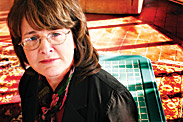
Claudio Calligaris
Epidemiology and biostatistics professor Jennifer O'Loughlin is in fifth spot. O'Loughlin's research team might have discovered why some young smokers become hooked on cigarettes so quickly. A variation in a single gene results in prolonged brain exposure to nicotine for some people. O'Loughlin and her team noticed that young smokers with this genetic variation are far more likely to become nicotine dependent, even if they smoke fewer cigarettes per week than those with the normal gene. For smokers with the genetic variation, even a handful of cigarettes could prove to be addictive. "There's no safe level of smoking for teenagers," O'Loughlin declared in an interview with Canadian Press. "The first puff is dangerous." Forty-six different media reported on O'Loughlin's study, including the Daily Telegraph, the New York Times and Radio-Canada's "Le Téléjournal."
6
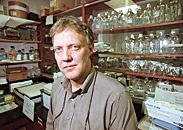
Owen Egan
Here is a tip of the hat to all the affectionate mothers of the world. Oh sure your surly teenager might cringe at the first hint of a hug these days, but chances are the ungrateful brat is a much healthier individual thanks to all the TLC you administered over the years. Psychiatry professor Michael Meaney has been involved in several studies that indicate that young rats, when groomed and fussed over by their moms, tend to be much more resilient in the face of stress-related disorders than peers who didn't get the same sort of attention. In a recent study, Meaney and McGill colleagues Ian Weaver and Moshe Szyf found further proof of this phenomenon and put forward the notion that by nurturing their rat pups, mother rats alter the activity of genes that play a large role in determining how well their offspring will cope with stress. Meaney's work captured the attention of 45 different media, including the Wall Street Journal, Le Devoir and the Globe and Mail.
7
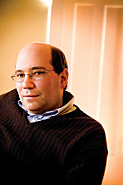
Claudio Calligaris
Every four years, history professor Gil Troy knows his phone is going to ring off the hook. That's because Troy is a leading expert on the history of U.S. presidential elections and on the way in which U.S. presidents' relationships with their families affects the way in which they are perceived by voters. Troy's expertise was sought after for news stories on Canadians' profound dislike of U.S. president George W. Bush, on Laura Bush's role as First Lady, on Hillary Clinton's presidential prospects for 2008 and on Democratic presidential hopeful Howard Dean's disastrous "scream" speech. Forty-one different media, including the New York Times, "Canada AM" and CBC Radio's "Cross Country Checkup," approached Troy for his comments.
8
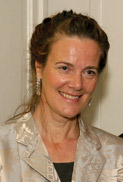
When NHL stars like Eric Lindros, Scott Stevens and Jeremy Roenick want to have their heads examined, chances are they take a flight to Montreal and visit with neurology and neurosurgery professor Karen Johnston. The director of the McGill Concussion Clinic, Johnston is one of North America's top concussion experts. High-profile athletes regularly seek out her medical advice after sustaining head injuries. The author of the McGill Concussion Protocol, a comprehensive program for diagnosing and treating concussion victims, Johnston believes doctors need to pay closer attention to the after-effects of head injuries to determine their severity — symptoms like headaches, nausea and dizziness, for example. Forty different media made note of Johnston and her work in 2004, including Sports Illustrated, the Ottawa Citizen and the Philadelphia Inquirer.
9
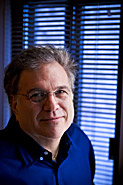
Claudio Calligaris
In ninth position is educational and counselling psychology professor Jeffrey Derevensky, the co-director of the McGill-based International Centre for Youth Gambling Problems and High Risk Behaviour. In recent years, Derevensky's research has done much to shine a spotlight on a growing concern: an ever-increasing number of teenagers are becoming addicted to various forms of gambling. Thirty-seven different media were interested in what Derevensky had to say on the topic, including People, CBC TV's "The Fifth Estate" and the Dallas Morning News.
10
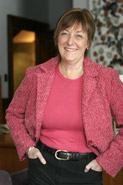
Owen Egan
In tenth spot is a familiar name to these annual newsmakers roundups. Margaret Somerville, founding director of the McGill Centre for Medicine, Ethics and Law, is one of North America's pre-eminent medical ethicists, and her phone number is on the speed dial of many a journalist: they keenly appreciate her ability to provide swift and thoughtful contexts for a wide range of ethical conundrums — everything from reality TV plastic surgery to the parental rights of sperm donors. Thirty-five different media organizations made use of her expertise last year, including the National Post, the Globe and Mail and "The O'Reilly Factor" on Fox News.
The McGill alumnus who turned up most often in news stories in 2004 that mentioned his ties to McGill was Hockey Hall of Fame goaltender turned federal cabinet minister Ken Dryden (LLB'73). Dryden, now Canada's minister of Social Development, was one of six McGill graduates named to Prime Minister Paul Martin's cabinet. Another graduate earning headlines on the political front was Ahmed Nazif (PhD'83), Egypt's new prime minister.
McGill graduate Conrad Black (MBA'73) discovered that, contrary to the popular truism, there is such a thing as bad publicity. The embattled press baron was ousted as CEO of Hollinger International and faces a lawsuit from the Securities and Exchange Commission in the U.S. over allegations that he used his company's money as a "personal piggybank." Black was named as the Canadian Press business newsmaker of the year, but all that coverage did little to boost sales of his weighty biography of Franklin D. Roosevelt.
Receiving far more favourable media attention was Auditor General Sheila Fraser (BCom'72), L'Actualité's choice for personality of the year. The magazine labelled Fraser and her team "les Zorros de nos impôts" for their blistering criticisms of federal government misspending, particularly on the scandal-ridden advertising contracts that are currently the focus of a special inquiry.
Other graduates who appeared often in the news in 2004, in stories that noted their ties to McGill, include recent Emmy-winner and unlikely singing sensation William Shatner (BCom'52), NDP leader Jack Layton (BA'71), NDP candidate Monia Mazigh (PhD'01, best known for her tireless efforts in helping to secure her husband Maher Arar's release from a Syrian prison), soprano Stephanie Marshall (BMus'98, she drew raves for her starring role in the operatic version of The Handmaid's Tale), young author David Bezmozgis (BA'96, his short story collection, Natasha, earned sensational reviews), film producer Lionel Chetwynd (BCL'67, Ike: Countdown to D-Day), Arcade Fire lead singer Win Butler (BA'04), whose band's first album, Funeral, led many music critics' top-ten lists this year, and businessman and philanthropist Seymour Schulich (BSc'61, MBA'65), who donated an eye-catching $26 million to the University of Western Ontario's Faculty of Medicine.
Update: Number eight edited for accuracy of title. (January 14, 2005)
